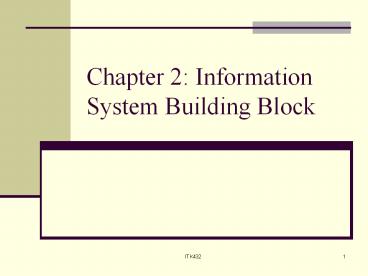Chapter 2: Information System Building Block - PowerPoint PPT Presentation
1 / 28
Title:
Chapter 2: Information System Building Block
Description:
Describe the role of information systems architecture in systems development. ... Identify three technologies that provide system designers and builders with a ... – PowerPoint PPT presentation
Number of Views:578
Avg rating:3.0/5.0
Title: Chapter 2: Information System Building Block
1
Chapter 2 Information System Building Block
2
Key Concepts
- Three building blocks of an information system
- Knowledge
- Process
- Communication
3
(No Transcript)
4
Front-Office Information Systems
- Support business functions that extend out to the
organizations customers (or constituents). - Marketing
- Sales
- Customer management
5
Back-Office Information Systems
- Support internal business operations of an
organization, as well as reach out to suppliers
(of materials, equipment, supplies, and
services). - Human resources
- Financial management
- Manufacturing
- Inventory control
6
A Federation of Information Systems
7
Information System Applications
8
Information Systems Architecture
- A unifying framework into which various
stakeholders with different perspectives can
organize and view the fundamental building blocks
of information systems.
9
High-Level Goals of System Owners and System
Users
- Improve business knowledge
- Improve business processes and services
- Improve business communication and people
collaboration
10
Technology Perspectives of System Designers
System Builders
- Database technologies that support business
accumulation and use of business knowledge - Software technologies that automate and support
business processes and services - Interface technologies that support business
communication and collaboration
11
Focuses for Information Systems
- Knowledge
- The raw material used to create useful
information. - Process
- The activities (including management) that carry
out the mission of the business. - Communication
- How the system interfaces with its users and
other information systems.
12
Views of Information Systems
- System owners view
- System users view
- System designers view
- System builders view
13
(No Transcript)
14
System Owners View (Knowledge)
- Interested not in raw data but in information
that adds new business knowledge and helps
managers make decisions. - Business entities and business rules.
15
System Users View (Knowledge)
- View data as something recorded on forms, stored
in file cabinets, recorded in books and
spreadsheets, or stored on computer. - Focus on business issues as they pertain to data.
- Data requirement a representation of users
data in terms of entities, attributes,
relationships, and rules independent of data
technology.
16
System Designers and System Builders view
(Knowledge)
- System designers view
- Data structures, database schemas, fields,
indexes, and constraints of particular database
management system (DBMS). - System builders view
- SQL
- DBMS or other data technologies
17
(No Transcript)
18
System Owners View (Process)
- Concerned with high-level processes called
business functions. - Business function a group of related processes
that support the business. Functions can be
decomposed into other subfunctions and eventually
into processes that do specific tasks. - A cross-functional information system a system
that supports relevant business processes from
several business functions without regard to
traditional organizational boundaries such as
divisions, departments, centers, and offices.
19
System Users View (Process)
- Concerned with work that must be performed to
provide the appropriate responses to business
events. - Business processes activities that respond to
business events. - Process requirements a users expectation of
the processing requirements for a business
process and its information systems. - Policy a set of rules that govern a business
process. - Procedure a step-by-step set of instructions
and logic for accomplishing a business process. - Work flow the flow of transactions through
business processes to ensure appropriate checks
and approvals are implemented.
20
(No Transcript)
21
System Designers View (Process)
- Concerned with which processes to automate and
how to automate them - Constrained by limitations of application
development technologies being used - Software specifications the technical design of
business processes to be automated or supported
by computer programs to be written by system
builders.
22
System Builders View (Process)
- Concerned with programming logic that implements
automated processes - Application program
- Prototyping
23
(No Transcript)
24
System Owners View (Communication)
- Who (which business units, employees, customers,
and partners) must interact with the system? - Where are these business units, employees,
customers, and partners located? - What other information systems will the system
have to interface with?
25
System Users View (Communication)
- Concerned with the information systems inputs
and outputs.
26
System Designers View (Communication)
- Concerned with the technical design of both the
user and the system-to-system communication
interfaces. - Interface specifications
- User dialogue
27
System Builders View(Communication)
- Concerned with the construction, installation,
testing and implementation of user and
system-to-system interface solutions. - Middleware
28
Network Technologies and the IS Building Blocks
Clean-layering approach allows any one building
block to be replaced with another while having
little or no impact on the other building blocks































